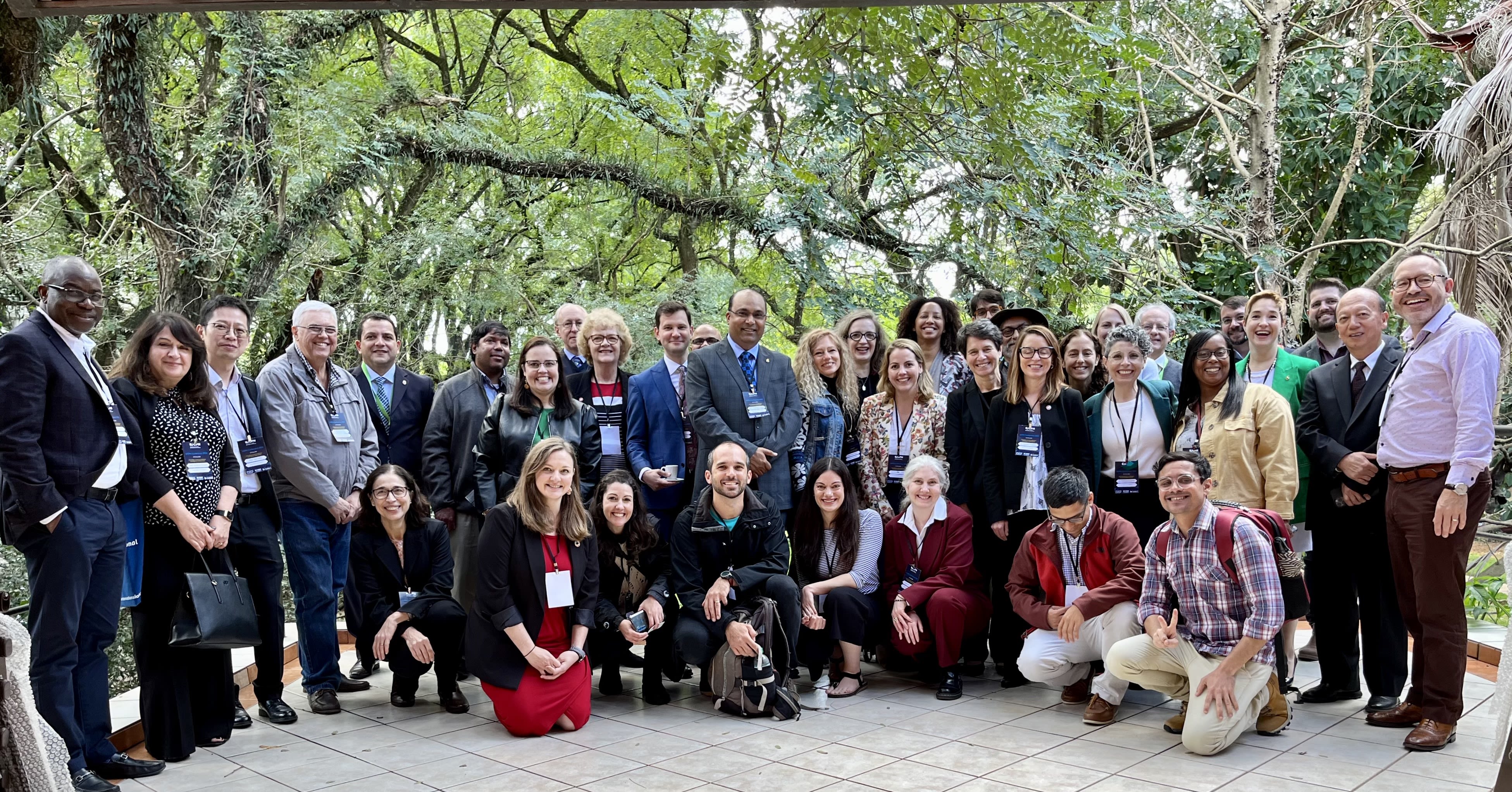Research Collaboration Fund
Seed funding supported by the University Global Partnership Network (UGPN)
This call closed on 19 May 2025. Awards will be announced in late July.

About the UGPN Research Collaboration Fund (RCF)
The University Global Partnership Network (UGPN) is a university consortium addressing sustainability challenges in diverse regions and local communities. Members include North Carolina State University (NC State), Universidade de São Paulo (USP), and the University of Surrey. The Research Collaboration Fund (RCF) provides seed-funding to foster innovative, high-quality and transdisciplinary research collaborations among the UGPN partner institutions. With a focus on addressing the Sustainable Development Goals (SDGs), the RCF supports bilateral and trilateral research teams to catalyse projects for academic and societal impact. We welcome engagement with industry, policy or community stakeholders, and we encourage projects that support early-career researchers in building their global networks or enable the inclusion of PhD students for enhanced research training.
Funding support
We will fund projects with up to US$10,000 (or the £, R$ equivalent) per participating institution in each successful proposal. This means a bilateral collaboration may be funded with up to US$20,000, and a trilateral collaboration may be awarded up to US$30,000. Funding will be awarded on the bases of strategic benefit and scholarly merit of proposals, along with availability of resources. We encourage proposals that include matched funding from other sources.
The 2025/2026 Call
For the 2025 call, the UGPN particularly welcomes proposals which:
- Contribute to addressing at least two SDGs
- Are transdisciplinary across STEM, Social Sciences, Humanities and the Arts
- Contribute to the broad research areas of food and water solutions; climate change and healthy communities; and one health more broadly (although all subject areas will be considered)
→ Food and water solutions
Addressing food and water challenges across the human, plant, and animal dimensions. Includes the nexus of food security, water scarcity, infectious diseases, and the environment, as well as related social structures, policies, and supply chains that impact global and local communities.
→ Climate change and healthy communities
Protecting the health of human populations, animals, and the environment from the effects of climate change and avoiding widening health inequities among ageing adults and other vulnerable populations. Includes the challenges of climate resilient built and natural environments; sustainable cities, communities and campuses; agricultural production; and nature-based health solutions.
→ One Health: The idea that the health of humans is connected to the health of other animals, plants, biodiversity and the environment. This call particularly welcomes proposals addressing the one health theme in the following topics:
- Agricultural production and land use
- Antimicrobial resistance
- Biodiversity and climate change
- Disease surveillance, prevention and response of chronic and infectious diseases
- Environmental health and sustainability
- Food safety and food security
- Global trade, commerce and security
- Mental health
- Occupational health
- Social structures, public policy, and ethics
- Water safety and security
- Wellbeing of humans, animals and ecosystems
Expected outputs and outcomes
Academic impact
Proposals should involve substantive international engagement and are expected to lead to high-quality outputs, including:
- Publication of co-authored papers from collaborative research and workshops.
- Joint proposals for external funding bids (including bids for PhD scholarships).
- International research training activities for graduate students, including PhD mobility and co-supervision, and engagement of early-career researchers.
- The RCF also supports research-led engagement with teaching and internationalising the curriculum (Potential outputs could include guest lectures, master classes, COIL and short courses; the development of teaching materials, joint modules or collaborative programmes).
- Outputs may also include the development of resources such as databases and data repositories, websites, research collaboration sites, or social networking tools to inform external funding bids or disseminate results.
Societal impact
Engagement with industry, policy and/or community stakeholders, with potential outputs including:
- Publication of policy briefs or opinion papers.
- Industry or policy-relevant training for PhD students and ECRs.
- Living labs for data collection, testing and analysis or proof-of-concept studies.
- Capacity-building for climate literacy or climate leadership, including activities to policy research, behavioural change and enhanced awareness.
- Public engagement activities
UGPN Community of Practice talks
During the grant period, we expect awardees to provide a webinar with the support of the UGPN Secretariat to engage the broader UGPN community.
Who can apply
All proposals must involve collaboration between faculty from at least two UGPN member institutions, with trilateral collaboration particularly welcomed.
Proposals are invited from permanent, tenured or tenure track faculty at all UGPN universities, as well as research professionals (those who comply with Sponsored Programs eligibility requirements) at NC State.
Please note:
→ Post-doctoral researchers based at the Universidade de São Paulo are not eligible to lead a project or receive funding for mobility.
→ We welcome proposals by applicants who have previously been involved or worked together on a UGPN RCF project, but the PI and research team must demonstrate how the proposal tackles a new problem and is distinct from previously funded projects.
Timeline & key dates
Submission deadline: Monday 19 May 2025 (17:00 UTC)
Results announced: Monday 14 July 2025
Funding period: 1 August 2025 - 31 July 2026. Please note that NC State project funds must be expended by 30 June 2026 to align with the end of the fiscal year.
Project period: 1 August 2025 - 31 January 2027. All projects in the 2025 call will benefit from 6-month cost-neutral extension with a view to supporting project management and encouraging more scope for impact and engagement.
How to apply
The Principal Investigator should submit an expression of interest via the online form below by 19 May 2025 (17:00 UTC).
Each PI will receive a Sharepoint online site link to complete the proposal form and budget template.
Please also read the submission guidelines in the section below for further information on to complete the forms and the supporting documents required.
Submission guidelines
Evaluation criteria
Proposals that meet the eligibility requirements will be reviewed and assessed by internal review panels at each of the three universities. A joint committee consisting of representatives from all UGPN partners will make the final decision for awards.
Proposals will be assessed with reference to the following criteria:
1) Relevance: degree to which the project addresses a globally important challenge and demonstrates innovative, transdisciplinary and sustainable collaboration among UGPN partners;
2) Proposal content: clearly articulates measurable goals, objectives and activities that are feasible (evidenced by a reasonable and justified budget) and align with the purpose of the RCF;
3) Outputs & impact: focus on achievable results that can lead to high impact outputs and the potential to leverage future funding, and clearly articulated pathways to academic and societal impact.
4) Research Team: involvement of a diverse team of appropriately qualified researchers from at least two UGPN partners (with diversity to include disciplinary approaches and gender, skills, and career profile of the researchers (PhD, Early Career Researcher, Mid-Career Researcher, etc)
In making their decisions, the joint selection panel will seek to support a representative variety of research topics.
Application materials
Please complete the online proposal form and budget template and upload the supplementary documents on the Sharepoint site.
- Proposal form:
- Project title;
- Principal investigator & Co-Investigator(s);
- Synopsis of the proposed project, which may be used to promote the project on our website;
- Project description (max. 1,000 words):
→ objectives and relevance of project;
→ how the project addresses a new
question or area of research (and has not previously been funded by the UGPN);
→ a work plan which clearly articulates the activities to be undertaken to achieve the objectives;
→ how the project aligns with the thematic focus of this RCF call and addresses least two Sustainable Development Goals (SDGs);
→ overview of the research team, including respective roles and contributions in the project, and diversity of the team;
- Benefit statement (max. 300 words) outlining expected project outputs and outcomes, including impact for academia and society. - Budget: please use the template to include a budget table with justification.
- CVs of the PI and Co-Is (max. 2 pages): please include the CV of one named representative per partner. The CV should include education, professional appointments, up to five (5) publications related to the proposed research or scholarship, and activities relevant to this grant application.
- Letters of support from Faculty Deans (or their designees) from each collaborating institution and from sources of any matching funds.
Eligible costs & activities
Travel & subsistence costs may include international and local travel, accommodation and subsistence associated with researchers spending time at partner institutions. Subsistence costs need to be line with staff expenditure policies at each participating institution.
Consumables directly related to the research project may include costs associated with hosting meetings, workshops and seminars, or costs for testing equipment, databases etc.
Dissemination costs may be requested for publications, media and other resources; the development of teaching and curriculum materials; and public engagement activities.
Research assistants can only be funded at the University of Surrey.
Planned expenditures should align with the participating institutions' financial policies. Eligible costs include:
- NC State: travel and subsistence; consumables directly related to the project; dissemination of results.
- USP: travel and subsistence; consumables directly related to the project; dissemination of results.
- University of Surrey: travel and subsistence; consumables directly related to the project; dissemination of results; and payment for research assistants.
- The inclusion of PhD or other Higher Degree Research students as project investigators must be indicated in the application.
- Please note that funding for the use of a UGPN partner’s laboratory facilities and infrastructure may not be included.
Reporting & acknowledgement
Acknowledgement of UGPN support: Recipients are expected to acknowledge UGPN in all subsequent published material and presentations.
Reporting: Successful applicants are required to submit a final report no later than one month after the end of the grant period.
Contact and enquiries
University of São Paulo
International Cooperation Office
Mr. Daniel Barcelos


